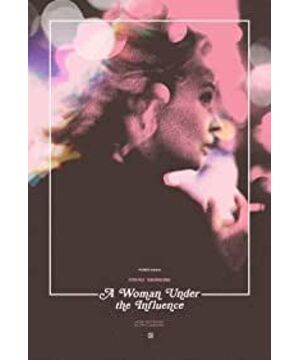The mid-1970s in America were a time of complexity, confusion, and disillusionment. In such a time of international turmoil, human beliefs have collapsed in the chaos of hedonism, and many have fallen into nihilism as a result. Subcultures and even countercultures such as hippies, drugs, rock music, sexual liberation and women's advancement flourished. Anxiety, emptiness, despair, and doubt began to creep into every corner of society and eventually engulfed everyone. Although the filmmakers of "Women Influence" believe that the connection between the film and the women's movement of the mid-to-late seventies is merely accidental, the film can indeed be seen as a microcosm of the atmosphere of that era. It shows a classic image of a woman struggling with family and society, and it will be forever in the history of film.
1. Historical perspective: the evolution of the female image on the screen
Before the 1970s, female characters on the American screen were often seen as sex symbols without ideas or rights, and served as adornments for male protagonists. Many of them are stereotyped and functionalized to meet what men expect from women, such as being beautiful and intelligent. At the same time, they are always absent or aphasia. In "Liuxiang Fangcao", we begin to see the presentation of another kind of woman. Although she still doesn't know what she wants to control, she at least wants to have control over herself. Affected Women is special because it shifts our focus from single women to married women. The focus of this film is not on a woman's physical attractiveness, but on prompting us to delve deeper into her mind and see things outside from her point of view. Later, during the height of the Western women's movement, more similar films were made, telling the stories of how countless women trapped in their families took control of their own destiny and were treated on an equal footing with men.
2. Personal, Family and Society Perspectives: Women in Film
Overall, before the mid-1970s, there were very few films in American film history that depicted the life of a housewife on the brink of collapse. Now, because of its special epochal significance, the long-neglected character is the focus of more filmmakers. Before the 1970s, as more and more Americans opted to move to the suburbs, Americans' social circles (especially those of housewives) inevitably shrank. As a result, people have gradually become more family-centric. In the film, Mabel, who has no personal life at all, revolves around her husband and children, often overwhelmed by feelings of emptiness, loss, loneliness and alienation, and seeks comfort from alcohol and cigarettes. Unlike Nick, who can confide in her pain to her mother, co-workers, or friends at home, Mabel lives her life almost in isolation, swallowing her loneliness and anxiety, and through bizarre ways. behaviors to release them, and these solitary behaviors were later considered symptoms of psychosis.
In addition, the spiritual world of housewives at the time was struggling with difficult choices within its inner dualism. During the 1970s, while some women motivated by ideas of gender equality chose to enter the workforce and deconstructed old family structures, others, still influenced by conservative ideas, retained their family identities and status. In contrast to the Hollywood classics, which always emphasized the American Dream (based on individual heroism in the service of capitalist ideology) and encouraged individuals to prove their worth by challenging others and even institutions, "Woman Affected" is a way to lay the groundwork. Contradictions and confusion within the main characters in Mabel tries to figure out her identity and emotional needs: she feels lost when she's alone, doesn't know what she wants and where she needs to go; her behavior is inconsistent and unpredictable to mask her fears .
As a family-focused film, "Women Affected" defines characters through the roles they play in different groups. Living in such a social environment, social interaction and interpersonal communication are important references for defining people. The individual ceases to exist once the relationship with others and society is lost. In the film, Mabel is socially defined as Nick's wife and mother of three children, which is considered her only achievement. She will never be able to leave her family because it is the only affirmation of her existence in a cold world without a job. As a vulnerable and insecure woman, Mabel has struggled to seek social approval from her family in an effort to meet her husband's demands as a good wife and mother, but it was all in vain. Throughout the film, we feel that Mabel needs Nick's constant love and confirmation that he can't live without her. Once Mabel's words embarrass Nick and his friends, she begins to doubt her own significance in the family relationship, but soon regains her confidence from children who think "she's the best mother in the world" . Later, she struggled and begged to stay at home even as she was violently treated and scolded by her husband at home. Although as a middle-class working class, her husband Nick does not have a high social status or rich material wealth, but as a core member of the family, he has the absolute right to speak and decide, and serves as a judge of Mabel's performance. In fact, Mabel makes it so easy for others to define and control her that she's even willing to risk losing her sense of self to a world that doesn't care about her at all.
The film reveals a world of ruthless regulated behavior. Constrained by the established framework of the social system, as a housewife, Mei Bao gradually lost her physical and mental freedom and individuality. Once Mabel tried to resist these routines, she was yelled at, beaten and sent to hospital by men to correct her "sociopathic" behavior through the punishment of violent treatment. In order to avoid being an emotional and presumptuous social outsider, Maybau, like those around her, wants to strive to obey the rules of patriarchal society. The increased social oppression at this time came from the conservative tendencies of the time. In an increasingly conservative mainstream society, concerned about the influence of the counterculture on mainstream society, conservatives feel ashamed when they talk about sex or nudity, and see any "abnormal" behavior that doesn't conform to social norms as a disease. Feminist consciousness finally begins to sprout in Mabel's mind when she is brutalized as a lunatic. She saw clearly the hypocrisy of capitalist society and the deceitfulness of the family, and tried to break free but was hurt more brutally. In her last hope, she turned to another man for help, who pretended to ignore her pleading and left. To make matters worse, even some women become servants of the patriarchal society to oppress her in order to keep the society running smoothly. Despite Mabel's inability to resist brutal oppression, we can still sense a residual emotional autonomy and acuity in her. What the filmmakers are trying to convey in this film is that we should be more open-minded about the people and circumstances around us, discard all pre-set character scripts, and become definers and creators of our own identities and relationships.
3. Characteristics of time: lack of privacy, doubts about capitalism, and loss of hope
The film reveals the general state of deprivation of privacy in America at the time. In the 1970s, the infiltration of the mass media and the revelations of the Watergate scandal evoked fear and anxiety among Americans about the blurring of the lines between public and private space. For example, the more Nick tries to hide a family scandal in the film, the faster it spreads among colleagues; while in their private home, we note that the dining room and bedroom are largely the same room, indicating that the private scarcity of space. The house was constantly hearing the phone ringing or being interrupted by outsiders (in most cases Nick's invitation, but it always upset Mabel, who was eager to have her own space), so Mabel's only private place left was toilet. Therefore, there will be a large wooden board on the toilet door with the word "privacy" clearly marked on it. Whenever she is offended by an intruder, she hides in the toilet to release her true self, which has been repressed for so long by the rules of society outside. The only time she seeks company and warmth outside the house is in a bar chatting with a stranger, and then having sex with him in a semi-conscious state. Although both viewers and Mabel keep it a secret, the ending reveals that Nick seems to have known it. It sends chills down our backs: how much privacy Mabel has left in this world.
The film deeply questions the assumption of American capitalism: the belief that all Americans will be saved and that people can succeed and improve their lives through legitimate competition and struggle. In the American society fraught with various crises such as inflation, the Vietnam War and the oil shock, people began to doubt the legitimacy and value of capitalism, and to reflect on how its ideology can eat people's hearts. In the end everything in society is questioned and nothing can be trusted. In a blurry and crumbling world, people cannot judge right from wrong, nor can they find beliefs to pursue and maintain.
During that chaotic period in America in the 1970s, everything looked like a mess, and there never seemed to be a solution and no future in sight. This sense of fear is deeply embedded in the film. At the end of the movie, we see Mabel returning to her family position again, but we don't know if the same tragedy will happen again, and we don't know how many times Mabel has been put into a mental hospital by her husband. Life is an endless cycle of constant struggle.
Overall, Cassavetes paints a gloomy and hopeless world where no one can escape. Still, in this depressing film, there is still hope, represented by children, that shines through the shatters. First, the existence of the three children themselves is the result of a series of violent movements and phenomena in the wave of the counterculture. Under the influence of sexual liberation and the baby boom, Maybaugh and her husband Nick are bound together by impulsiveness and chaos like any other young man whose life has been disrupted by an unplanned pregnancy and hastily married. However, compared to the chaos of the adult world, the children's world is still pure, full of love, innocence, imagination and freedom. In the film, Mabel is most comfortable in the company of her children, who will never judge her by social standards like adults, and always accept her true self. In a way, Maybe herself is like an innocent and impulsive child who refuses to grow up, because adulthood means hypocrisy, apathy, and self-repression. Looking back through the 1970s in the United States, we can see that the younger generation challenged and rejected the traditions of the adult world, refusing to compromise with this corrupt and disappointing society. At the end of the film, this expectation of young people is more clearly manifested. The children became the bond that saved the broken marriage and Mabel's only spiritual sustenance, and the only reason for her to return to her original family position.
View more about A Woman Under the Influence reviews










